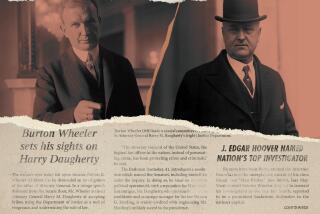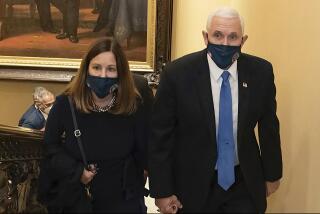Reagan Aid to Poindexter Seen as Problematical : Iran-Contra: The ex-President’s support could help the former security aide. But memory lapses may cause jurors to discount his testimony.
- Share via
WASHINGTON — As former President Ronald Reagan began eight hours of videotaped testimony, he winked at defendant John M. Poindexter, immediately establishing himself as the first character witness for the former White House national security adviser.
Throughout his testimony--which will be played for the jury in Poindexter’s trial, to start on March 5, and which was previewed by the press Thursday--Reagan underlined his confidence in his embattled former aide, setting a mood that may spread across the entire defense case.
However, Reagan frequently said he could not remember details, something that may cause the jury to give less weight to his testimony. And Reagan’s answers to some specific questions could prove to be damaging to Poindexter, who faces trial on five felony counts of obstruction of Congress, making false statements and conspiracy.
Richard Ben-Veniste, a former Watergate prosecutor who is now a Washington defense lawyer, said Friday of the Reagan testimony, “There’s something here for everybody. In substance, the testimony would seem to favor the prosecution on the bottom-line issue: There was no specific authorization for lying to Congress or other alleged improper acts by Poindexter.
“On the other hand, having the President with a porous recollection and having the boss appear electronically in the courtroom can be useful to the defense in terms of fashioning arguments on behalf of Poindexter,” he added. “It’s going to depend on what lawyers on both sides can make of it, how skillful they are in making use of this raw material.”
E. Lawrence Barcella, a former federal prosecutor and now a Washington defense attorney, said Reagan’s testimony could be helpful to the defense if Poindexter’s jurors share the attitudes of some of the jurors who convicted former White House aide Oliver L. North of three felonies last May. The North jurors said that they had been inclined to treat the former Marine lieutenant colonel leniently because they considered him to be a pawn carrying out instructions from higher-ups.
“To the extent that the defense can show that Poindexter’s activities came to the attention of the President himself, and to the extent that you can characterize these matters as political, it obviously is advantageous to Poindexter,” Barcella said.
Reagan insisted that he had never authorized or condoned any illegal acts by Poindexter or any other Administration official, seemingly closing off a possible defense that, even if Poindexter committed technical breaches of the law, he had presidential approval for doing so.
“At any time, did you ever approve or give authority to John Poindexter to make any false or misleading statements to any congressional committee regarding events related to the Iran-Contra controversy?” prosecutor Dan K. Webb asked in a direct reference to the count of the indictment charging Poindexter with obstructing Congress.
“No,” Reagan replied.
But he immediately added: “And I don’t think any false statements were made.”
In court papers submitted after Reagan testified last week in Los Angeles but before the tape was shown to reporters in Washington Thursday, Poindexter’s lawyer, Richard W. Beckler, said that the former President’s testimony “is favorable to the defense.” He did not elaborate.
In an exchange with Beckler and Judge Harold H. Greene during the videotaped hearing, Webb said that Reagan, in answers to questions, had seemed to establish “an atmosphere that he approved and authorized much of what John Poindexter did.” But Webb said he intended to show “that John Poindexter and Oliver North were engaged in a lot of underlying Contra-related and Iran-related activities that (Reagan) did not know about, did not approve of, did not authorize.”
How all of this will play with the jury, of course, remains to be seen. Presumably, Beckler will introduce the tape at the start of the defense case. By that time, the prosecution will have presented its own case, which it has not disclosed yet. In a way, the prosecution has a tactical advantage because Webb can tailor his presentation to minimize the impact of the defense’s star witness.
In response to questions from Beckler, Reagan said that he considered it vitally important to keep secret the sale of arms to Iran because he believed that the lives of hostages in Lebanon could be at stake. He said he hoped to conceal the Iran initiative from Congress because of concern about leaks from Capitol Hill. But his memory became vague when he was asked about steps he might have taken to preserve the secret.
“Do you recall giving Adm. Poindexter . . . any instructions with regard to assembling together the story or re-enacting what had gone on the past few years?” Beckler asked.
“No, I do not,” Reagan replied.
“Did there come a time at all when you and Adm. Poindexter met with . . . members of Congress and tried to relate to them what had gone on?” Beckler asked.
“I don’t recall anything having to do with the Congress in that sense,” Reagan said.
Reagan said repeatedly that he had relied on Poindexter and other aides for information about the Iran-Contra affair and never doubted what he was told. At one point, he said: “I had full confidence . . . in those people that were right at hand and conducting the affairs.”
More to Read
Sign up for Essential California
The most important California stories and recommendations in your inbox every morning.
You may occasionally receive promotional content from the Los Angeles Times.













